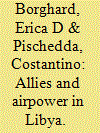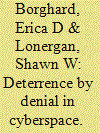|
|
|
Sort Order |
|
|
|
Items / Page
|
|
|
|
|
|
|
| Srl | Item |
| 1 |
ID:
118200


|
|
|
| 2 |
ID:
110538


|
|
|
|
|
| Publication |
2011.
|
| Summary/Abstract |
A large literature in political science takes for granted that democratic leaders would pay substantial domestic political costs for failing to carry out the public threats they make in international crises, and consequently that making threats substantially enhances their leverage in crisis bargaining. And yet proponents of this audience costs theory have presented very little evidence that this causal mechanism actually operates in real-as opposed to simulated-crises. We look for such evidence in post-1945 crises and find hardly any. Audience cost mechanisms are rare because (1) leaders see unambiguously committing threats as imprudent, (2) domestic audiences care more about policy substance than about consistency between the leader's words and deeds, (3) domestic audiences care about their country's reputation for resolve and national honor independent of whether the leader has issued an explicit threat, and (4) authoritarian targets of democratic threats do not perceive audience costs dynamics in the same way that audience costs theorists do. We found domestic audience costs as secondary mechanisms in a few cases where the public already had hawkish preferences before any threats were made.
|
|
|
|
|
|
|
|
|
|
|
|
|
|
|
|
| 3 |
ID:
190773


|
|
|
|
|
| Summary/Abstract |
Many scholars and practitioners are unconvinced that cyber deterrence is possible. This article aims to demonstrate why some of this skepticism is misplaced, as well as provide greater clarity and conceptual rigor to the proliferation of arguments within the United States about deterrence in cyberspace. Specifically, we argue that cyber deterrence frameworks that draw from the traditional nuclear deterrence literature and the logic of deterrence by punishment are mismatched to deterrence challenges in cyberspace. Instead, we advocate for a deterrence by denial approach, but one that is oriented around counter-cyber operations rather than simply improving defenses. While there has been some scholarship and work by practitioners that implicitly rests on a deterrence by denial logic, they suffer from a lack of systematic assessment of how traditional denial concepts, especially those developed in the conventional deterrence literature, could be extended to cyberspace. Therefore, in this article, we review different deterrence concepts in theory and practice, articulate a logic of cyber deterrence by denial, and provide policy recommendations for the United States.
|
|
|
|
|
|
|
|
|
|
|
|
|
|
|
|
| 4 |
ID:
122008


|
|
|
|
|
| Publication |
2013.
|
| Summary/Abstract |
In the abundant recent analysis of a nuclearising Iran, scholars and other experts have identified several dangers. The Iranian regime could bully regional rivals, increase its influence in Iraq, further challenge US power in the Gulf and set off a proliferation cascade. Another oft-cited danger is that, protected from retaliation by its nuclear shield, Iran will step up its support for proxy groups in the Middle East. Even without increased backing from Tehran, Hizbullah and Hamas may be emboldened to increase their attacks on Israel, believing that they are covered by an Iranian 'nuclear umbrella'. With a few exceptions, however, most recent analysis fails to explain how Iran would use the bomb to bring about such changes. As outlined by Paul R. Pillar, professor at Georgetown University, most commentary 'links Iran with sundry forms of objectionable behaviour, either real or hypothetical, without explaining what difference the possession of a nuclear weapon would make'. To understand the threats posed by a nuclear-armed Iran, therefore, and to devise policies to avert or mitigate these dangers, we must analyse the causal link between nuclearisation and its potential consequences.
|
|
|
|
|
|
|
|
|
|
|
|
|
|
|
|
| 5 |
ID:
153178


|
|
|
|
|
| Summary/Abstract |
What are the dynamics of coercion in cyberspace? Can states use cyber means as independent tools of coercion to influence the behavior of adversaries? This article critically assesses traditional coercion theory in light of cyberspace's emergence as a domain in which states use force, or its threat, to achieve political objectives. First, we review the core tenets of coercion theory and identify the requisites of successful coercion: clearly communicated threats; a cost–benefit calculus; credibility; and reassurance. We subsequently explore the extent to which each of these is feasible for or applicable to the cyber domain, highlighting how the dynamics of coercion in cyberspace mimic versus diverge from traditional domains of warfare. We demonstrate that cyber power alone has limited effectiveness as a tool of coercion, although it has significant utility when coupled with other elements of national power. Second, this article assesses the viability and effectiveness of six prominent warfighting strategies in the traditional coercion literature as applied to the cyber domain: attrition, denial, decapitation, intimidation, punishment, and risk. We conclude that, based on the current technological state of the field, states are only likely to achieve desired objectives employing attrition, denial, or decapitation strategies. Our analysis also has unique implications for the conduct of warfare in cyberspace. Perhaps counterintuitively, the obstacles to coercion that our analysis identifies may prompt states to reevaluate norms against targeting civilian infrastructure.
|
|
|
|
|
|
|
|
|
|
|
|
|
|
|
|
|
|
|
|
|